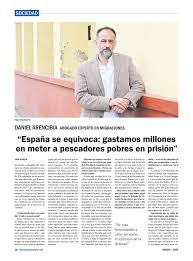Spain
Facilitating unauthorised migration is regulated in Spain by Article 318 bis of the Criminal Code.
The first quantitative analysis of boat driver cases in Spain has been carried out by Canarian lawyer Daniel Arencibia. He analysed 300 sentences of trials against people accused of driving the boats ("patrones de embarcación" in Spanish) in 2022 and 2023, which involved 500 accused people accused. All information related to the study is available here.

These data are a preliminary estimate, and the number of people criminalised in Spain in this period is considered to be higher. Arecibia's study does not include all cases of criminalisation, given that the official data is not up to date (for example in the Canary Islands the last update is from mid-June 2023), the study does not include all the Autonomous Communities of the Spanish state and minors are not included.
Despite this, this study allows us to make some initial reflections on criminalisation practices in Spain, as Arencibia has shared in multiple interviews.
The report estimates that out of the 500 criminalised persons, 311 are migrants. Therefore, the application of the facilitation laws mainly affects migrants.
The average sentence is between 2 and 3 years. Prosecutor often offers plea bargain for reduced sentence if defendant pleads guilty, an agreement that most of the defendants accept. Prosecution requests 8 years of imprisonment when the accused doesn't plea guilty.
The period of pre-trial detention is usually between one and two years.
Evidence against accused persons is often very weak or non-existent. The police often offer work and residence permits to people who were in the same boat if they accuse the boat driver.
Cases
- 9-Fuerteventura: "Spain charges nine migrants with 'mutiny' after dramatic scenes at sea" by Infomigrants (04.10.2023).
- Moha (Fuerteventura, 15 years old): "Los niños de los cayucos que acaban en prisión: ''Decían que yo era el patrón/The children of the cayuco boats who end up in prison: ‘’They said I was the boat driver‘’) by Eldiario.es (08.12.2023).
- 4LaGomera: "Condenados a cuatro años y medio de cárcel cuatro patrones de cayuco en el que falleció un migrante/Four drivers of a cayuco in which a migrant died sentenced to four and a half years in prison" by Eldiario.es (7 .12.2023).
- Ablaye (Tenerife, 16 years old): "Llegó a Canarias en patera con 16 años y entró en prisión acusado de ser patrón: ahora está en libertad provisional pendiente de juicio/He arrived in the Canary Islands by boat at the age of 16 and went to prison accused of being a boat driver: he is now on provisional release pending trial" by Eldiario.es (19.05.2023).
- 10Tenerife: "Decretan prisión para diez migrantes acusados de capitanear cuatro cayucos llegados a Canarias/Prison sentences for ten migrants accused of captaining four cayucos that arrived in the Canaries" by Publico (29.12.2023).